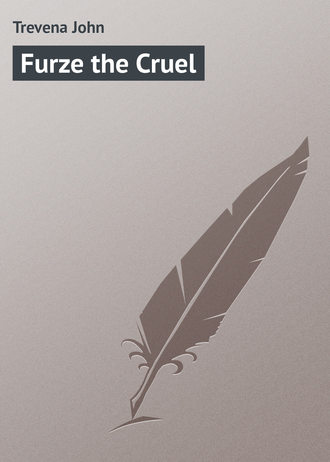 полная версия
полная версияFurze the Cruel
Innocent of idols, Thomasine went on sewing in her stone kitchen amid the granite. She had finished putting a frill along the hem of her petticoat; now she put one higher up in regions which would be invisible however much the wind might blow, though she did not know why, because she could not think. It was a waste of material; nobody would see it; but she felt that a fair petticoat ought to be adorned as lavishly as possible. She did not often glance up. There was nothing to be seen in the court except the usual fowls. It was rarely an incident occurred worth remembering. Sometimes one stag attacked another, and Thomasine would be attracted to the window to watch the contest. That made a little excitement in her life, but the fight would soon be over. It was all show and bluster; very much like the sparring of two farm hands. "You'm a liar." "So be yew." "Aw well, so be yew." And so on, with ever-increasing accent upon the "yew." Not many people crossed the court. There was no right of way there, but Farmer Chegwidden had no objection to neighbours passing through.
Whether Thomasine was pretty could hardly be stated definitely. It must remain a matter of opinion whether any face can be beautiful which is entirely lacking in expression, has no mind behind the tongue, and no speaking brain at the back of the eyes. Many, no doubt, would have thought her perfection. She was plump and full of blood; it seemed ready to burst through her skin. She was somewhat grossly built; too wide at the thighs, big-handed, and large-footed, with not much waist, and a clumsy stoop from the shoulders. She waddled in her walk like most Devonshire farm-maids. Her complexion was perfect; so was her health. She had a lust-provoking face; big sleepy eyes; cheeks absolutely scarlet; pouting lips swollen with blood, almost the colour of an over-ripe peach. It was more like paint than natural colouring. It was too strong. She had too much blood. She was part of the exaggeration of Dartmoor, which exaggerates everything; adding fierceness to fierceness, colour to colour, strength to strength; just as its rain is fiercer than that of the valleys, and its wind mightier. Thomasine was of the Tavy family, but not of the romantic branch. Not of the folklore side like Boodles, but of the Ger Tor family, the strong mountain branch which knows nothing and cannot think for itself, and only feels the river wearing it away, and the frost rotting it, and the wind beating it. The pity was that Thomasine did not know she had a mind, which was already fading for want of use. She knew only how to peel potatoes and make herself wanton underwear. Although twenty-two years of age she was still a maid.
There were steps upon the stones, and Thomasine looked up. She saw nobody, but sounds came through the open window, a shuffling against the wall of the house, and the stumbling of clumsy boots. Then there was a knock.
There was nothing outside, except miserable objects such as Brightly with an empty and battered basket and starving Ju with her empty and battered stomach and her tongue hanging out. They were still trying to do business, instead of going away to some lonely part of the moor and dying decently. It was extraordinary how Brightly and Ju clung to life, which wasn't of much use to them, and how steadfastly they applied themselves to a sordid business which was very far less remunerative than sound and honest occupations such as idol-making. Brightly looked smaller than ever. He had forgotten all about his last meal. His face was pinched; it was about the size of a two-year-old baby's. He looked like an eel in man's clothing.
"Any rabbit-skins, miss?" he asked.
"No," said Thomasine.
Brightly crept a little nearer. "Will ye give us a bite o' bread? Us be cruel hungry, and times be hard. Tramped all day yesterday, and got my cloam tored, and lost my rabbit-skins and duppence. Give me and little dog a bite, miss. Du'ye, miss."
"If master was to know I'd catch it," said Thomasine.
"Varmer Chegwidden would give I a bite. I knows he would," said Brightly.
Chegwidden would certainly have given him a bite had he been present, or rather his sheep-dog would. Chegwidden was a member of the Board of Guardians in his sober moments, and it was his duty to suppress such creatures as Brightly.
"I mun go on," said the weary little wretch, when he saw that Thomasine was about to shut the door. "I mun tramp on. I wish yew could ha' given us a bite, miss, for us be going to Tavistock, and I don't know if us can. Me and little dog be cruel mazed."
"Bide there a bit," said Thomasine.
There was nobody in the house, except Mrs. Chegwidden, who was among her pickle jars and had never to be taken into consideration. Chegwidden had gone to Lydford. The girl had a good heart, and she didn't like to see things starving. Even the fowls had to be fed when they were hungry, and probably Brightly was nearly as good as the fowls. She returned to the door with bread and meat, and a lump of cheese wrapped in a piece of newspaper. She flung Ju a bone as big as herself and with more meat upon it, and before the fit of charity had exhausted itself she brought out a jug of cider, which Brightly consumed on the premises and increased in girth perceptibly.
"Get off," said Thomasine. "If I'm caught they'll give me the door."
Brightly was not well skilled in expressing gratitude because he had so little practice. He was generally apologising for his existence. He tried to be effusive, but was only grotesque. Thomasine almost thought he was trying to make love to her, and she drew back with her strained sensual smile.
"I wun't forget. Not if I lives to be two hundred and one, I wun't," cried Brightly. "Ju ses her wun't forget neither. Us will get to Tavistock now, and us can start in business again to-morrow. Ye've been cruel kind to me, miss. God love ye and bless ye vor't, is what I ses. God send ye a good husband vor't, is what I ses tu."
"You'm welcome," said Thomasine.
Brightly beamed in a fantastic manner through his spectacles. Ju wagged what Nature had intended to be a tail, and staggered out of the court with her load of savoury meat. Then the door was closed, and Thomasine went back to her petticoat.
The girl could not exactly think about Brightly, but she was able to remember what had happened. A starving creature supposed to be a man, accompanied by a famished beast that tried to be a dog – both shocking examples of bad work, for Nature jerry-builds worse than the most dishonest of men – had presented themselves at the door of her kitchen, and she had fed them. She had obeyed the primitive instinct which compels the one who has food to give to those who have none. There was nothing splendid about it, because she did not want the food. Yet her master would not have fed Brightly. He would have flung the food into the pig-sty rather than have given it to the Seal. So it was possible after all that she had performed a generous action which was worthy of reward.
It must not be supposed that Thomasine thought all that out for herself. She knew nothing about generous actions. She had listened to plenty of sermons in the chapel, but without understanding anything except that it would be her duty some time to enter hell, which, according to the preacher's account, was a place rather like the top of Dartmoor, only hotter, and there was never any frost or snow. Will Pugsley, with whom she was walking out just then, had summed up the whole matter in one phrase of gloomy philosophy: "Us has a cruel hard time on't here, and then us goes down under." That seemed to be the answer to the riddle of the soul's existence: "having a cruel hard time, and then going down under."
Thomasine had never read a book in her life. They did not come her way. Town Rising had none, except the big Bible – which for half-a-century had performed its duty of supporting a china shepherdess wreathing with earthenware daisies the neck of a red and white cow – a manual upon manure, and a ready reckoner. No penny novelette, dealing with such matters of everyday occurrence as the wooing of servant-girls by earls, had ever found its way into her hands, and such fictions would not have interested her, simply because they would have conveyed no meaning. A pretty petticoat and a fair-day; these were matters she could appreciate, because they touched her sympathies and she could understand them. They were some of the things which made up the joy of life. There was so much that was "cruel hard"; but there were pleasures, such as fine raiment and fair-days, to be enjoyed before she went "down under."
Thomasine was able to form mental pictures of scenes that were familiar. She could see the tor above the barn. It was easy to see also the long village on the side of the moor. She knew it all so well. She could see Ebenezer, the chapel where she heard sermons about hell. Pendoggat was sometimes the preacher, and he always insisted strongly upon the extremely high temperature of "down under." Thomasine very nearly thought. She almost associated the preacher with the place which was the subject of his discourse. That would have been a very considerable mental flight had she succeeded. It came to nothing, however. She went on remembering, not thinking. Pendoggat had tried to look at her in chapel. He could not look at any one with his eyes, but he had set his face towards her as though he believed she was in greater need than others of his warnings. He had walked close beside her out of chapel, and had remarked that it was a fine evening. Thomasine remembered she had been pleased, because he had drawn her attention towards a fact which she had not previously observed, namely, that it was a fine evening. Pendoggat was a man, not a creeping thing like Brightly, not a lump of animated whisky-moistened clay like Farmer Chegwidden. No one could make people uncomfortable like him. Eli Pezzack was a poor creature in comparison, although Thomasine didn't make the comparison because she couldn't. Pezzack could not make people feel they were already in torment. The minister frequently referred to another place which was called "up over." He reminded his listeners that they might attain to a place of milk and honey where the temperature was normal; and that was the reason why he was not much of a success as a minister. He seemed indeed to desire to deprive his congregations of their legitimate place of torment. What was the use of talking about "up over," which could not concern his listeners, when they might so easily be stimulated with details concerning the inevitable "down under"? Pezzack was a weak man. He refused to face his destiny, and he tried to prevent his congregations from facing theirs.
Thomasine looked at the clock. It was time to lift the peat from the hearth and put on the coal. Chegwidden would soon be back from Lydford and want his supper. She admired the petticoat, rolled it up, and put it away in her work-basket.
"Dear life!" she murmured. "Here be master, and nothing done."
A horseman was in the court, and crossing it. The window was open. The rider was not Chegwidden. It was the master of Helmen Barton, his head down as usual, his eyes apparently fixed between his horse's ears; his head was inclined a little towards the house. Thomasine stood back and watched.
A piece of gorse in full bloom came through the window, fell upon the stone floor, and bounded like a small beast. It jumped about on the smooth cement, and glided on its spines until it reached the dresser, and there remained motionless, with its stem, which had been bared of prickles, directed upwards towards the girl like a pointing finger. Pendoggat had gone on. His horse had not stopped, nor had the rider appeared to glance into the kitchen. Obviously there was some connection between Pendoggat, that piece of gorse, and herself, only Thomasine could not work it out. She picked it up. She could not have such a thing littering her tidy kitchen. The sprig was a smother of blossom, and she could see its tiny spears among the blooms, their points so keen that they were as invisible as the edge of a razor. She brought the blooms suddenly to her nose, and immediately one of the tiny spears pierced the skin and her strong blood burst through.
"Scat the vuzz," said Thomasine.
Iron-shod hoofs rattled again upon the stones, and the light of the window became darkened. Pendoggat had changed his mind and was back again. He tumbled from the saddle and stood there wagging his head as if deep in thought. Supposing she was wanted for something, the girl came forward. Pendoggat was close to the window, which was a low one. She did not know what he was looking at; not at her certainly; but he seemed to be searching for her, desiring her, sniffing at her like an animal.
"Du'ye want master, sir? He'm to Lydford," said Thomasine.
A drop of blood fell from her nose and splashed on the stone floor between them. She searched for a handkerchief and found she had not got one. There was nothing for it but to use the back of her hand, smearing the blood across her lips and chin. Pendoggat saw it all. He noticed everything, although he had his eyes on the window-sill.
"You're a fine maid," he said.
"Be I, sir?" said Thomasine, beginning to tremble. Pendoggat was her superior. He was the tenant of Helmen Barton, a commoner, the owner of sheep and bullocks, and married, or at least she supposed he was. She felt somehow it was not right he should say such a thing to her.
"Going to chapel Sunday night?" he went on, with his head on one side, and his face as immobile as a mask.
"Ees," murmured Thomasine, forgetting the "sir" somehow. The question was such a familiar one that she did not remember for the moment the standing of the speaker. This was the man who had drenched her with hell-fire from the pulpit.
"How do ye come home? By the road or moor?"
"The moor, if 'tis fine, sir. I walks with Willum."
"Young Pugsley?"
"Ees, sir."
"You're too good for him. You're too fine a maid for that hind. You won't walk with him Sunday night. I'll see you home."
"Ees, sir," was all Thomasine could say. She was only a farm-maid. She had to do as she was told.
"Going to the fair?" he asked.
The answer was as usual.
"I'll meet you there. Take you for rides, and into the shows. Got your clothes ready?"
The same soft word, which Thomasine made a dissyllable, and Boodles sang as an anthem, followed. Goose Fair was the greatest day in the girl's year, and to be treated there by a man with money was to glide along one of the four rivers of Paradise, only that was not the expression which occurred to Thomasine.
Pendoggat reached in and took her hand. It was large with labour, and red with blood, but quite clean. He pulled her towards him. There was nobody in the court; only the unobservant chickens, pecking diligently. A cloud had settled upon the top of the tor, which was just visible above the barn, an angry cloud purple like a wound, as if the granite had pierced and wounded it. Thomasine wondered if it would be fine for Goose Fair.
Her sleeve was loose. Pendoggat pressed his fingers under it, and paddled the soft flesh like a cat up to her elbow.
"Don't ye, sir," pleaded Thomasine, feeling somehow this was not right.
"You're a fine, lusty maid," he muttered.
"'Tis time master was back from Lydford, I reckon," she murmured.
"You're bloody."
"'Twas that bit o' vuzz."
He drew her closer, threw his arm clumsily round her neck, dragged her half through the window, kissing her savagely on the neck, lips, and chin, until his own lips were smeared with her blood, and he could taste it. She began to struggle. Then she cried out, and he let her go.
"Good blood," he muttered, passing his tongue over his lips. "The strongest and best blood on Dartmoor."
Then, he flung himself across his horse, as if he had been drunk, and rode out of the court.
CHAPTER VI
ABOUT VOCAL AND INSTRUMENTAL MUSIC
There was a concert in Brentor village in aid of that hungry creature the Church, which resembles so many tin- and copper-mines, inasmuch as much more money goes into it than ever comes out. Brentor is overdone with churches. There is one in the village, and the little one on the tor outside. Maids like to be married on the tor. They think it gives them a good start in life, but that idea is owing to tradition, which connects Brentor with the worship of Baal. The transition from Paganism to Christianity was gradual, and in many cases the old gods were merely painted up and made to look like new. The statue of Jove was bereft of its thunderbolt, given a bunch of keys, and called Peter; the goddess of love became a madonna; the sun-temple was turned into a church. Where the original idea was lost sight of a legend was invented; such as that of the merchant who, overtaken by a storm when beating for shore, vowed to build a church upon the first point of land which should appear in sight. There is no getting away from sun-worship upon Dartmoor, and no easy way of escape from tradition either. That is why maids like to be sacrificed upon Brentor, even when the wind is threatening to sweep them down its cliffs.
Local talent was not represented at the concert. People from Tavistock came to perform; all sorts and conditions of amateurs in evening dress and muddy boots. The room was crowded, as it was a fine evening, and therefore there was nothing to prevent the inhabitants of the two holy Tavys from walking across the moor, and a jabbering cartload had come from Lydford also. There was no chattering in the room. The entire audience became appalled by respectability as represented by gentlemen with bulging shirt-fronts and ladies with visible bosoms. They stared, they muttered hoarsely, they turned to and fro like mechanical figures; but they did not chatter. They felt as if they were taking part in a religious ceremony.
The young lady who opened proceedings, after the inevitable duet on the piano – which, to increase the sense of mystery, was called on the practically illegible programme a pianoforte – with a sentimental song, made an error. She merely increased the atmosphere of despondency. When she had finished some of the audience became restless. They were wondering whether the time had come for them to kneel.
"Bain't him a cruel noisy thing?" exclaimed Mary, with a certain amount of enthusiasm. "What du'ye call 'en?" she asked a small, dried-up ancient man who sat beside her, while indicating the instrument of music with an outstretched arm.
The old man tried to explain, which was a thing he was famous for doing. He was a superannuated school-master of the nearly extinct type, the kind that knew nothing and taught as much, but a brave learned man according to some of the old folk.
Peter sat by his sister, trying to look at his ease; and he too listened intently for what school-master had to say. Peter and Mary were blossoming out, and becoming social and gregarious beings.
This was the first grand entertainment they had ever attended. Tickets had been given them, or they would certainly not have been there. As Peter had failed in his efforts to sell the tickets they had decided to use them, although dressing for the event was something of an ordeal. Mary had a black hat and a silk dress, both of early Victorian construction, and beneath, her huge nailed boots innocent of blacking. Peter wore a tie under his chin, and a wondrous collar some three inches lower down. The rest of his costume was also early nineteenth century in make, but effectual. He was very much excited by the music, but dreadfully afraid of showing it.
"That there box," said Master, with an air of diving deep in the well of wisdom "he'm full o' wires and hammers."
"My dear life!" gasped Mary. "Full o' wires and hammers! Du'ye hear, Peter?"
Her brother replied in the affirmative, although in a manner which suggested that the information was superfluous.
"Volks hit them bones, and the bones dra' on the hammers, and the hammers hit the wires," proceeded Master.
"Bain't that artful now?" cried Mary.
"Sure 'nuff," agreed Peter, unable to restrain his admiration.
"Couldn't ye mak' one o' they? You'm main cruel larned wi' your hands," Mary went on.
Peter admitted that was so. Given the material, he had no doubt of his ability to turn out a piano capable of producing that music which his sister described as cruel noisy.
"It taketh a scholard to understand how to mak' they things," said Master, with some severity. "See all that carved wood on the front of him? You couldn't du that, and the piano wouldn't mak' no music if 'twasn't for the carved wood. 'Twould mak' a noise, you see, Peter, but not music. 'Tis the noise coming out through the carving what makes the music. Taketh a scholard to du that."
"Look at she!" cried Mary violently, as another lady rose to warble. This songster had a good bust, and desired to convince her audience of the fact. "Her ha' grown out of her clothes sure 'nuff. Her can't hardly cover her paps."
"Shet thee noise, woman," muttered Peter.
"Her be in full evening dress," explained Master.
Mary subsided in deep reflection. She knew perfectly well what "full" meant. There were plenty of full days upon Tavy Cleave. It meant a heavy wet mist which filled everything so that nothing was visible. For Mary every word had only one meaning. She could not understand how the word "full" could bear two exactly opposite meanings.
The back seats were overflowing. Only threepence was charged there, but seats were not guaranteed. The majority stood, partly to show their independence, chiefly to look as if they had just dropped in, not with any idea of being entertained, but that they might satisfy themselves there was nothing objectionable in the programme. Several men stood huddled together as near the door as possible, showing their disapproval of such frivolity in the usual manner, by standing in antagonistic attitudes and frowning at the performers. Chegwidden was there, containing sufficient liquor to make him grateful for the support of the wall. He had tried to get in for nothing, by explaining that he was a member of the Board of Guardians, and had been from his youth a steadfast opponent of the Church as by law established. These excuses having failed, he had paid the threepence under protest, explaining at the same time that if he heard anything to shock his innocent mind he should demand his money back, visit his solicitor when next in Tavistock with a view to taking action against those who had dared to pervert the public mind, and indite letters to all the local papers. The entertainment committee had a troublesome threepennyworth in Farmer Chegwidden. He had already spent a couple of shillings in liquor, and would spend another couple when the concert was over. That was money spent upon a laudable object. But the threepence demanded for admission was, as he loudly proclaimed, money given to the devil.
Near him stood Pendoggat, his head down as usual, and breathing heavily as if he had gone to sleep. He looked as much at home there as a bat flitting in the sunlight among butterflies. Every one was surprised to see Pendoggat. Members of his own sect decided he was there to collect material for a scathing denunciation of such methods from the pulpit of Ebenezer. Chegwidden pushed closer, and asked hoarsely, "What do 'ye think of it, varmer?"
"Taking money in God's name to square the devil," answered Pendoggat.
"Just what I says," muttered Chegwidden, greatly envying the other's powers of expression. "Immortality! That's what it be, varmer. 'Tis a hard word, but there ain't no other. Dirty immortality!" He meant immorality, but was confused by righteous indignation, the music, and other things.
"Can't us do nought?" Chegwidden went on. "Us lets their religion bide. They'm mocking us, varmer. That there last song was blasphemy, and immortality, and a-mocking us all through."
Pendoggat muttered something about a demonstration outside later on, to mark their disapproval of such infamous attempts to seduce young people from the paths of rectitude. Then he relapsed into taciturnity, while Chegwidden went on babbling of people's sins.
Most of the ill-feeling was due to the fact that the room had been used several years back as a meeting-house, where the pure Gospel had flowed regularly. Chegwidden's father had carried his Bible into a front seat there. Souls had been saved in that room; anniversary teas had been held there; services of song had been given; young couples, whose Nonconformity was unimpeachable, had conducted their amours there; and upon the outside of the door had been scrawled shockingly crude statements concerning such love-affairs, accompanied by anatomical caricatures of the parties in question. It was holy ground, and representatives of a hostile sect were defiling it.





